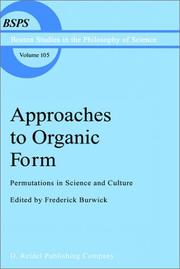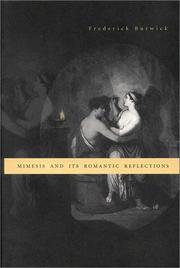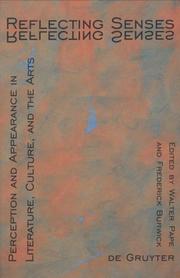| Listing 1 - 10 of 15 | << page >> |
Sort by
|

ISBN: 9027725411 9401082375 9400939175 Year: 1987 Volume: vol 105 Publisher: Dordrecht Boston Lancaster Reidel
Abstract | Keywords | Export | Availability | Bookmark
 Loading...
Loading...Choose an application
- Reference Manager
- EndNote
- RefWorks (Direct export to RefWorks)
Aesthetics --- Organism (Philosophy) --- Philosophy --- Beautiful, The --- Beauty --- Esthetics --- Taste (Aesthetics) --- Art --- Criticism --- Literature --- Proportion --- Symmetry --- Psychology --- Aesthetics. --- Organism (Philosophy). --- Esthétique. (Mélanges) --- Esthetica. (Versch. onderwerpen) --- Radio broadcasting Aesthetics
Book
ISBN: 9780521889674 9780521182416 0521889677 9780511770500 9780511769696 0511769695 0511847882 1107201276 0521182417 1282655167 9786612655166 0511768850 0511766629 0511765231 051176801X 0511770502 Year: 2009 Publisher: Cambridge Cambridge University Press
Abstract | Keywords | Export | Availability | Bookmark
 Loading...
Loading...Choose an application
- Reference Manager
- EndNote
- RefWorks (Direct export to RefWorks)
Drama in the Romantic period underwent radical changes affecting theatre performance, acting, and audience. Theatres were rebuilt and expanded to accommodate larger audiences, and consequently acting styles and the plays themselves evolved to meet the expectations of the new audiences. This book examines manifestations of change in acting, stage design, setting, and the new forms of drama. Actors exercised a persistent habit of stepping out of their roles, whether scripted or not. Burwick traces the radical shifts in acting style from Garrick to Kemble and Siddons, and to Kean and Macready, adding a new dimension to understanding the shift in cultural sensibility from early to later Romantic literature. Eye-witness accounts by theatre-goers and critics attending plays at the major playhouses of London, the provinces, and on the Continent are provided, allowing readers to identify with the experience of being in the theatre during this tumultuous period.
Drama --- Theatrical science --- English literature --- anno 1700-1799 --- anno 1800-1899 --- Great Britain --- Théâtre et société --- Theater --- English drama --- Acting --- Theater audiences --- Theaters --- Theater and society --- Théâtre --- Théâtre anglais --- Art dramatique --- Théâtre et société --- History --- History and criticism. --- History. --- Stage-setting and scenery --- Political aspects --- Histoire --- Histoire et critique --- Publics --- Décors et mise en scène --- Aspect politique --- Dramatics --- Histrionics --- Professional theater --- Stage --- Theatre --- Performing arts --- Actors --- Society and theater --- Opera-houses --- Playhouses (Theaters) --- Theatres --- Arts facilities --- Auditoriums --- Centers for the performing arts --- Music-halls --- Audiences, Theater --- Theatergoers --- Theater attendance --- Elocution --- Social status --- Social aspects --- Audiences

ISBN: 0271020377 9780271020372 Year: 2001 Publisher: University Park (Pa.): Pennsylvania state university press,
Abstract | Keywords | Export | Availability | Bookmark
 Loading...
Loading...Choose an application
- Reference Manager
- EndNote
- RefWorks (Direct export to RefWorks)
Mimesis in literature. --- Romanticism. --- Mimésis dans la littérature --- Romantisme --- Representation (Literature) --- Literature --- anno 1800-1899 --- Mimesis in literature --- Romanticism --- Pseudo-romanticism --- Romanticism in literature --- Aesthetics --- Fiction --- Literary movements --- Imitation in literature --- Realism in literature
Book
ISBN: 9781107111653 110711165X 1107529166 1316362051 1316364054 1316363058 1316358658 1316365050 1316276082 9781316276082 9781107529168 9781316358658 1316349659 1316355659 Year: 2015 Publisher: Cambridge Cambridge University Press
Abstract | Keywords | Export | Availability | Bookmark
 Loading...
Loading...Choose an application
- Reference Manager
- EndNote
- RefWorks (Direct export to RefWorks)
Between the advent of the French Revolution and the short-lived success of the Chartist Movement, overworked and underpaid labourers struggled to achieve solidarity and collective bargaining. That history has been told in numerous accounts of the age, but never before has it been told in terms of the theatre of the period. To understand the play lists of a theatre, it is crucial to examine the community which that theatre serves. In the labouring-class communities of London and the provinces, the performances were adapted to suit the local audiences, whether weavers, or miners, or field workers. Examining the conditions and characteristics of representative provincial theatres from the 1790s to 1830s, Frederick Burwick argues that the meaning of a play changes with every change in the performance location. As contributing factors in that change, Burwick attends to local political and cultural circumstances as well as to theatrical activities and developments elsewhere.
Theater --- English drama --- Working class --- Théâtre --- Théâtre (genre littéraire) anglais --- Classe ouvrière --- History --- History and criticism. --- Histoire et critique.
Book
ISBN: 0191750700 0191651095 9780191750700 9780191651083 0191651087 9780199644179 0199644179 9780199229536 0199229538 9780191651090 Year: 2009 Publisher: Oxford : Oxford University Press,
Abstract | Keywords | Export | Availability | Bookmark
 Loading...
Loading...Choose an application
- Reference Manager
- EndNote
- RefWorks (Direct export to RefWorks)
A comprehensive survey of Samuel Taylor Coleridge's writings as a poet and literary critic, as a philosopher and lecturer, as a commentator on religion and politics. Provides 37 specially written contributions by an international team of experts providing the most advanced scholarship in each area.
Coleridge, Samuel Taylor, 1772-1834 -- Criticism and interpretation -- Handbooks, manuals, etc. --- English --- Languages & Literatures --- English Literature --- Coleridge, Samuel Taylor, --- Coleridge, S. T. --- Kolʹridzh, Samuil, --- Кольридж, Самуил, --- Kolʹridzh, Samuil Teĭlor, --- Кольридж, Самуил Тейлор, --- Kūlīridzh, Ṣāmwīl Tīlūr, --- קולרידג׳, סמיואל טיילור --- Kūlīridj, Ṣāmwīl Tīlūr, --- كولردج، صمويل تيلور, --- קאָלרידש, ס. ט., --- Criticism and interpretation. --- 820.015.55 --- 820-1 "18" --- 820.015.55 Engelse literatuur: literaire stromingen: romantiek --- Engelse literatuur: literaire stromingen: romantiek --- 820-1 "18" Engelse literatuur: poëzie--19e eeuw. Periode 1800-1899 --- Engelse literatuur: poëzie--19e eeuw. Periode 1800-1899 --- Criticism and interpretation
Book
ISBN: 9783110850277 Year: 2012 Publisher: Berlin Boston
Abstract | Keywords | Export | Availability | Bookmark
 Loading...
Loading...Choose an application
- Reference Manager
- EndNote
- RefWorks (Direct export to RefWorks)

ISBN: 3110889447 9783110889444 3110145804 9783110145809 Year: 1995 Publisher: Berlin ; New York : W. de Gruyter,
Abstract | Keywords | Export | Availability | Bookmark
 Loading...
Loading...Choose an application
- Reference Manager
- EndNote
- RefWorks (Direct export to RefWorks)
Aesthetics, Modern. --- Illusion (Philosophy) --- Illusion in literature. --- Representation (Philosophy) --- Information theory in aesthetics. --- Aesthetics --- Cybernetics --- Perception --- Psychology --- Representationalism (Philosophy) --- Representationism (Philosophy) --- Culture --- Philosophy --- Hallucinations and illusions --- Knowledge, Theory of --- Modern aesthetics
Book
ISBN: 1280697210 9786613674173 0809386054 9780809386055 9780809329755 0809329751 0809302624 Year: 2010 Publisher: Carbondale, Ill. : Southern Illinois University Press,
Abstract | Keywords | Export | Availability | Bookmark
 Loading...
Loading...Choose an application
- Reference Manager
- EndNote
- RefWorks (Direct export to RefWorks)
The five essays presented here-Rhetoric, Style, Language, Conversation, and Greek Literature-were published together for the first time in The Collected Writings of Thomas De Quincey in 1889-1890. Frederick Burwick brings the essays together again in this volume, introducing them by tracing the sources and development of a belletristic theory of rhetoric, which he says "is one of the most original, and for a few critics, the most puzzling of the nineteenth century." Burwick makes the edition complete with a comprehensive index and a selected
Rhetoric. --- Language and languages --- Speaking --- Authorship --- Expression --- Literary style --- Rhetoric --- De Quincey, Thomas,
Multi
ISBN: 9783030960797 9783030960780 9783030960803 9783030960810 Year: 2022 Publisher: Cham Springer International Publishing :Imprint: Palgrave Macmillan
Abstract | Keywords | Export | Availability | Bookmark
 Loading...
Loading...Choose an application
- Reference Manager
- EndNote
- RefWorks (Direct export to RefWorks)
"Along with providing an encyclopedic examination of early nineteenth-century performances, dramaturgy, and theatrical techniques and apparatuses, Time in Romantic Theatre recovers and celebrates forgotten dramatists, plays, and dramatic subgenres. Future scholarship will benefit from and build on Frederick Burwick's insights and discoveries." William D. Brewer, Professor of English, Appalachian State University "Time in Romantic Theatre adds significantly to our knowledge about nineteenth-century theatre and performance. It reveals how Romantic drama represents time in creative ways by using flashbacks and flashforwards, compression and extension, memory and anticipation, and alternative temporalities. Enjoyable as well as instructive to read, this book is full of fascinating insights into the interactions of playwrights, actors, managers, set designers, reviewers, and audiences in the world of Romantic theatre. There is no one better qualified than Frederick Burwick to bring this world to life for modern readers." Angela Esterhammer, Professor of English, University of Toronto The shift in temporal modalities of Romantic Theatre was the consequence of internal as well as external developments: internally, the playwright was liberated from the old imperative of "Unity of Time" and the expectation that the events of the play must not exceed the hours of a single day; externally, the new social and cultural conformance to the time-keeping schedules of labour and business that had become more urgent with the industrial revolution. In reviewing the theatre of the Romantic era, this monograph draws attention to the ways in which theatre reflected the pervasive impact of increased temporal urgency in social and cultural behaviour. The contribution this book makes to the study of drama in the early nineteenth century is a renewed emphasis on time as a prominent element in Romantic dramaturgy, and a reappraisal of the extensive experimentation on how time functioned. Frederick Burwick, Emeritus Professor at UCLA, is author and editor of thirty-four books and one hundred sixty-five articles. He has worked extensively on Romantic drama and Anglo-German literary relations. He is the general editor of the three-volume Encyclopedia of Romantic Literature (2012) and editor of The Oxford Handbook of Samuel Taylor Coleridge (2009). Recent monographs include A History of Romantic Literature (2019), British Drama of the Industrial Revolution (2015) and Playing to the Crowd, London Popular Theatre, 1780-1830 (2011).
Theatrical science --- Literature --- World history --- History --- theater --- geschiedenis --- literatuur --- sociale geschiedenis --- Time in literature. --- English drama.
Book

ISBN: 9780823292943 Year: 2022 Publisher: New York, NY
Abstract | Keywords | Export | Availability | Bookmark
 Loading...
Loading...Choose an application
- Reference Manager
- EndNote
- RefWorks (Direct export to RefWorks)
| Listing 1 - 10 of 15 | << page >> |
Sort by
|

 Search
Search Feedback
Feedback About UniCat
About UniCat  Help
Help News
News